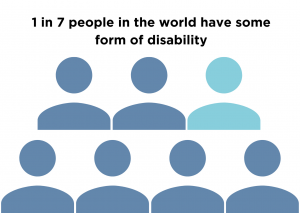And how philanthropy can help make that happen
Beyond the direct environmental and physical impacts of climate change, there are social, political, and cultural implications of a warming world. While rising sea levels, increased global temperatures and melting glaciers make the headlines, people are being directly impacted by a changing climate. And those most impacted are often least responsible for the causes of global warming, while simultaneously most susceptible to the impacts. For environmental justice organisations and funders, this is the issue at hand.
While climate justice movements have been a platform to amplify the voices and power of a diverse group of communities including women, people of colour, and Indigenous peoples, persons with disabilities continue to be disproportionately underrepresented in the climate conversation.
 One in seven people in the world have some form of disability, but they are routinely left out of advocacy and action to protect rights to a clean and healthy environment. With unique insights about injustice, structural barriers, and how to address them, people with disabilities have an enormous amount to offer the environmental and climate justice movement including many creative and relevant solutions that can improve communities, strengthen human rights, and protect our shared planet.
One in seven people in the world have some form of disability, but they are routinely left out of advocacy and action to protect rights to a clean and healthy environment. With unique insights about injustice, structural barriers, and how to address them, people with disabilities have an enormous amount to offer the environmental and climate justice movement including many creative and relevant solutions that can improve communities, strengthen human rights, and protect our shared planet.
There are numerous connections between environmental problems and disability: lack of clean water, pesticide poisoning, air pollution, oil spills, mercury contamination, silicosis, worker safety in extractive industries, and climate-induced migration, to name a few. In the places where the environment has been degraded the most, such as industrial sacrifice zones and oil contaminated communities, rates of disability are remarkably high, and not coincidentally, so is poverty. Climate change, loss of land, water, and clean air threaten the rights of people with disability to enjoy safe and productive lives. During climate emergencies, people who are deaf or blind may not have equal access to warning alerts, and those with mobility issues may not be able to access shelters.
If environmental justice seeks the fair treatment of all people with respect to environmental decisions and policy, then persons with disabilities must be part of the discussion, and yet they are regularly excluded from decision-making, and face ablism, stigmatisation, and discrimination. For persons with disability, this means that climate solutions and adaptation plans may be designed without their needs in mind, and they may not have equal access to the green jobs and opportunities of a just transition. For climate movements, it means they are missing valuable perspectives, talent, and experience that could broaden and enrich their agendas and increase their power to create systemic change.
At the international level, the conversation around disability and climate has been expanding. In May 2020, the United Nations released their first report on disability rights in the context of climate change in response to a July 2019 Resolution of the UN Human Rights Council on Human Rights and Climate Change and building on the Sendai Framework for Disaster Risk Reduction, the first major agreement of the 2030 Agenda for Sustainable Agenda, which incorporates persons with disabilities as stakeholders and considers them in relieving the impacts of disasters.
The philanthropic space is beginning to take action as well. Global Greengrants Fund, in partnership with The Ford Foundation, is funding grassroots activist groups on several continents advocating for inclusion and rights for persons with disabilities in the context of climate change.
In this work, we have found significant silos that isolate climate justice and disability rights communities. Addressing these silos creates opportunities for both movements to grow stronger through building relationships, shared learning, and finding common agendas. Many grassroots Disabled Persons Organizations have told us that they need to learn more about climate change and environmental justice and how these issues relate to their communities.
If environmental justice seeks the fair treatment of all people with respect to environmental decisions and policy, then persons with disabilities must be part of the discussion
‘People with disabilities need to be trained, build capacities in the subject so that they will make it a priority in the promotion of their rights,’ acknowledges Cameroonian disability rights activist, Chick Sama, of the Coordinating Unit of Associations of Persons with Disabilities (CUAPWD). ‘In our communities, many believe that environmental justice is not a disability issue, and that’s an important concern. Gradually, PWDs are starting to perceive themselves as someone who can make a difference.’
Pratima Gurung, president of the National Indigenous Disabled Women Association Nepal, shares this experience of being overlooked, despite having vital knowledge and skills needed by climate justice movements. She explains, ‘Structural discrimination is particularly complex for people with disabilities, because we belong to several oppressed populations. However, when we wish to participate in struggles that affect the whole population, we are systematically marginalised from social justice movements. We are everywhere, but we are invisible.’
Environmental and climate philanthropy is only starting to acknowledge this invisibility, having largely ignored persons with disability and their contributions to the fight against climate change. By making a deliberate effort to include them in our work, however, we can help address injustices that compound the climate crisis, while creating opportunities to dramatically expand the climate movement.
Peter Kostishack is Vice President and Director of Programs at the Global Greengrants Fund.



Comments (2)
Excellent article with a very thought-provoking perspective. Thank you!
Terrific article. It’s essential to include OPDs in leading climate justice, and you show not only that it’s essential but that there are talented activists and orgs to do so!